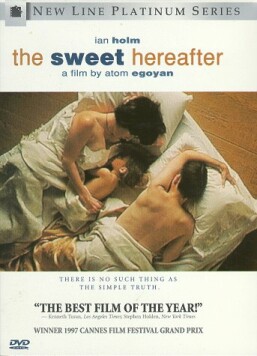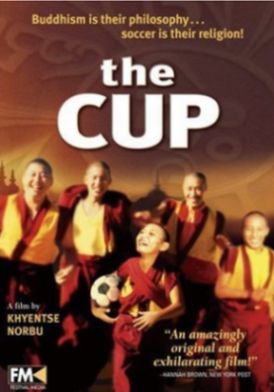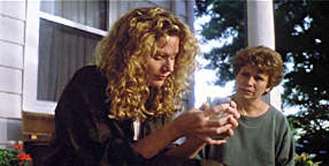Apostle, The
Hallaleujah, it’s a miracle! The Apostle is a (more or less) mainstream Hollywood film that neither patronizes nor trivializes nor demonizes religion. Written and directed by and starring Robert Duvall, the picture is a tour de force for Mr Duvall, who has given himself a wonderfully juicy part as the itinerant evangelist Sonny Dewey, a.k.a. the Apostle E.F. But it suffers to some extent from the sort of self-indulgence that is so hard to resist, no doubt, when you have complete creative control. For one thing, the film is far too long. Mr Duvall gets to do his amazing impersonation of a black preacher for a good half hour longer than anyone but Mr Duvall himself would think necessary to make his point. But, having said that, you have said about all there is to be said, negatively, about this production.
The passion of Sonny is evident from the beginning, but so is the sincere desire for holiness. When he finds his wife, Jessie (Farrah Fawcett) in bed with his young youth minister and himself locked out of his own church, he goes a little crazy. We see him conducting a monologue in a loud tone of voice in his mother’s house, ostensibly talking to Jesus. “If you won’t give me back my wife, give me peace. Give me peace!” he calls to him. “I’ve always called you Jesus, and you’ve always called me Sonny,” he says. When an angry neighbor calls to complain of the noise. Momma tells him that her son “sometimes talks to the Lord; sometimes he yells at the Lord.”
Finally, having taken to drink, Sonny brains his rival with a baseball bat “I beat him like a one-legged stepchild, that’s what I done,” he says to his one true friend, Joe (Billy Joe Shaver). “I think he might be on the road to glory this time.” So, one step ahead of the police, he sets off from his home in Texas to begin a new life.
His flight does not take him far. He gets as far as Bayou Bouté, Louisiana, where he teams up with a retired black preacher called the Rev. C. Charles Blackwell (John Beasley), to restart the now derelict church where he, Blackwell, had once been pastor. Sonny, now calling himself “the Apostle E.F.” is a dynamo of energy. He works two jobs and spends his spare time painting and fixing up the old church. He also becomes a regular on the radio, on a local station run by Elmo (Randy Dial). “No speakin’ on tongues,” insists Elmo. Sonny agrees. He will “preach on the devil backwards and forwards,” he says, “but no speakin’ on tongues.” Blackwell tells him, “When they hear you on the radio, most all the white people think you’re black. Most all the black people, know you ain’t black, but they sure do like your style of preaching.”
Gradually the racially mixed church (though largely black) becomes a success—although, like Jesus himself, “the Apostle” warns his flock that one day he’ll have to leave them. There is a brief though chaste romance with the receptionist at the radio station, a separated woman called Toosie (Miranda Richardson), and we are reminded of a mention in one of his confessional monologues to God of a history of “womanizing.” But Toosie gets back with her husband before the affair can come to anything, and Sonny must rejoice at a marriage saved, even if it is not his own. Then one day Jessie is listening to the radio back in Texas when she hears through the static the unmistakable tones of Sonny’s preaching. The Louisiana state police come for him as he is preaching to a full congregation one Sunday night.
This climactic sermon is too long, but it includes a wonderful moment when Sonny says that there is only one place in all the world where Jesus can’t come in, “and that is in the heart of the man or woman who closes the door to Him and says, ‘No, you can’t come in tonight’.” And we are reminded of his last date with Toosie, when he had asked to come in, and she had said no. Next time. “Maybe there won’t be a next time,” he had said. And there was not. It is a nice way of bringing together the sacred and the profane in the same way that the two are all mixed up in Sonny’s mind. But where Hollywood would normally be unable to see this mixture as anything but a species of hypocrisy, Duvall treats it much more sensitively.
One side note. In what is perhaps the most moving scene in the film, we watch Sonny change the heart of a truculent racist, played by Billy Bob Thornton, who has come to the church with a front end loader with the purpose of knocking it down. Sonny puts down his Bible in front of his machine and says that no man shall remove that book. A slightly doubtful Billy Bob makes as if to move it, but when he kneels down, Sonny kneels with him and prays over him. The man begins to weep. “This may be the first conversion we ever had over the airwaves,” says Elmo, who is broadcasting the church social at the time. It is a scene which could easily have been glib and unconvincing; instead it has a real emotional power, as does much else in the film. Yet as I was coming out of the critics’ screening where I saw it, I heard one of my colleagues say to another, “Of course that scene with Billy Bob must have been a set-up.”
Now there’s a guy who’s been watching too many movies.
Discover more from James Bowman
Subscribe to get the latest posts to your email.







